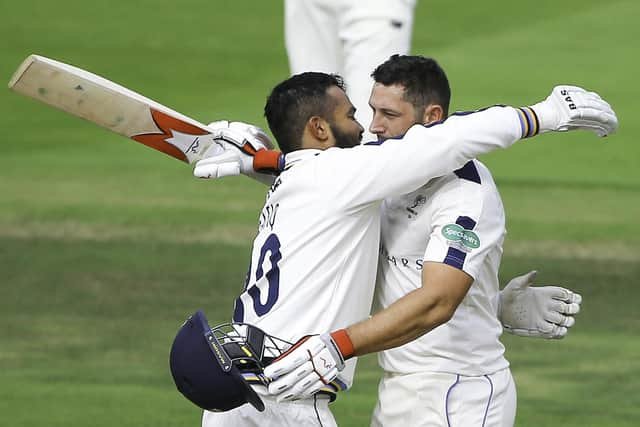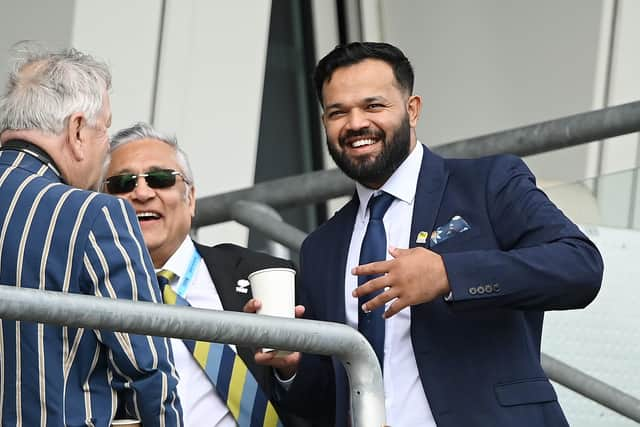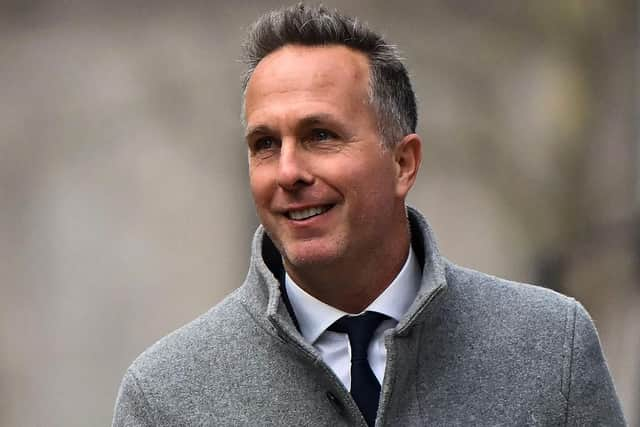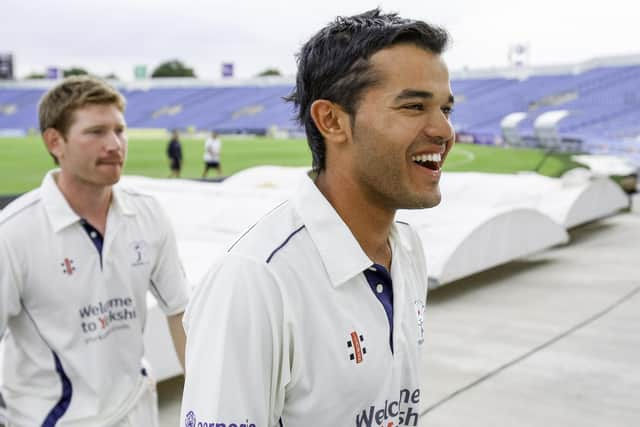Cricket left scared of its own shadow after a racism crisis that will never bring full closure - Chris Waters comment
None more so, perhaps, than in the concluding remarks of the Cricket Discipline Commission (CDC) verdict into the case of Michael Vaughan, one of six men accused of using racist and/or discriminatory language towards Azeem Rafiq, their former Yorkshire team-mate.
“The Panel had to consider whether the case as presented to it by the ECB, in light of all the evidence, was sufficiently accurate and reliable, on the balance of probabilities, to rule out mistake,” read the CDC ruling. “It was not.”
Advertisement
Hide AdAdvertisement
Hide AdOr, to put it another way, as the game digested a document that upheld at least some of the charges against each of the others (John Blain, Tim Bresnan, Andrew Gale, Matthew Hoggard and Richard Pyrah), all of whom withdrew from the process sighting fairness concerns, and only of one whom, Hoggard, admitted to the charges against him, albeit in a qualified way, the CDC said that the England and Wales Cricket Board did not present an accurate and reliable case against Vaughan, one of English cricket’s greatest captains.


Some indictment, that, on the governing body.
Some indictment, too, on the process per se, for if the ECB’s case against Vaughan was not accurate and reliable, then what of its cases against the others, who considered that the ECB investigation that led to the charges against them was a witch-hunt, based on their view that the ECB had already sided with Rafiq at the height of the scandal in late 2021, when it suspended Yorkshire from hosting international cricket and when a number of individuals were sacked by the club without so much as a nod to transparency or due process.
Indeed, the 82-page document contained enough additional examples of fallibility to elicit much sorrow that Vaughan was the only one of those charged to defend himself publicly, albeit with the assistance of a top legal team.
Two charges against Bresnan – that he used the term “the brothers” to refer to players of Asian ethnicity and, like Vaughan, had said the words “you lot” when referring to Rafiq and other Asian players, all with discriminatory intent, were not proved.


Advertisement
Hide AdAdvertisement
Hide AdDitto not dissimilar “you lot” allegations against Hoggard and Pyrah.
Of the charges that were upheld, Hoggard, like Gary Ballance before him, admitted some culpability while seeking to contextualise comments made many moons ago.
Unless one is operating in a state of complete denial, there can be no doubt that Hoggard and Ballance said things that were clearly unacceptable, whatever the context, and it is to the credit of both that they have held up their hands and apologised for that.
It is the mark of men that they take such responsibility.


In a not entirely unimpressive piece of work by the CDC (credit where credit is due to the panel of chair Tim O’Gorman, Dr Seema Patel and Mark Milliken-Smith, who were presented with a hospital pass) perhaps the most glaring gripe, or at least questionable conclusion to these eyes in terms of the evidence they had to go on, was a seeming willingness to uphold accusations against Blain, Bresnan, Gale and Pyrah, not least on the basis that Hoggard and Ballance had admitted to similar offences/language.
Advertisement
Hide AdAdvertisement
Hide AdOnly the individuals themselves will know the truth or otherwise of matters alleged, but it was that type of conclusion, that sort of allegation, which was meritorious of the kind of cross-examination from which Vaughan’s case so clearly benefited, none of which is the fault of the CDC, of course, which several times expressed frustration that it had not had more to go on, so to speak.
As such, it effectively did what the Yorkshire investigation, led by the law firm Squire Patton Boggs, did in 2020/21, which was to make the best of a bad job, an incomplete picture, in this case an investigation by the ECB that was so flawed that it would take an entire forest of trees to arm one with sufficient paper to highlight the various mis-steps.
It would not be stretching it, in fact, to say that Inspector Clouseau might have been embarrassed by the ECB’s handling of the case, one which complemented perfectly the botched, actually biased work of the DCMS select committee and its chair Julian Knight MP, who was rather forced to dip in-and-out of events owing to what might be termed the karma of the universe.


One thing which struck this correspondent as he read the 82-page document was that so much of what is alleged will forever remain contested hearsay, some of it of the children-in-the-playground, they-all-need-their-heads-knocking-together variety.
Advertisement
Hide AdAdvertisement
Hide AdSome of the allegations invited a charge of hypocrisy, or at least the counter-claim that the same sort of comments were made by accused and accuser; ergo, six-of-one, half-a-dozen of the other.
For instance, Ajmal Shahzad told the ECB investigation team that “you lot” was something that he and his Yorkshire team-mate Adil Rashid would have said to the club’s English players – in other words, it worked both ways, and the words were never meant maliciously.
Similarly, Hoggard insisted that the P-word was “widely used throughout the squad because a number of players of ethnic minority referred to themselves as such, so the word became used with what appeared to be implied consent and without any racial abuse or other harm intended”. That does not excuse the language, but it does provide a context. Some of Hoggard’s contemporaries during the time that he played, during the 1990s/2000s, dispute his claim that the P-word was widely used, which only further muddies the picture.
Also in its concluding remarks into the Vaughan case, when he was alleged to have told Rafiq and a group of Asian players “there are too many of you lot, we need to have a word about it” before a Yorkshire game in 2009, the CDC made this observation:
Advertisement
Hide AdAdvertisement
Hide Ad“These findings do not in any way undermine the wider assertions made by AZR (Rafiq), many of which of course have been confirmed by the admissions of both YCCC and certain individuals, as well as by other findings of this panel.”
The point is fair, and yet the conclusion does not strike one as necessarily sound, more an attempt not to criticise Rafiq and/or hurt individual feelings, which was also evident in the statements – however well-intentioned – of the ECB, Yorkshire and indeed Vaughan, as in fact it has been throughout a crisis in which one has had to risk walking over hot coals in an effort to get to the truth of a complex, nuanced narrative owing to the sensitive subject matter.
Rafiq, remember, had been utterly insistent that Vaughan said the words – “the comment made me feel sick and angry, and it has really stuck with me, even to this day”, he said in his witness statement, so on what basis the CDC can say that their ruling does not undermine Rafiq’s wider assertions is unclear, which is not to say that those assertions are wrong either.
None of which detracts from surely the most depressing conclusion of all: namely, that there will never be full closure in this toxic, relentless, desperately sad story.
Advertisement
Hide AdAdvertisement
Hide AdIndeed, nothing that has happened during the two-and-a-half years of the crisis – the initial SPB investigation, the ECB investigation, the CDC findings, let alone the DCMS select committee/political intervention, has done anything but throw up more questions and confusion, suspicion and animosity.
It has been not so much a story of institutional racism as one of institutional failure – be that Yorkshire; the ECB; the Professional Cricketers’ Association; the various anti-discriminatory groups/charities which have been much too quick to pass judgement and apportion blame on anyone who would dare challenge the narrative and, by definition, hold back the moral cause, regardless of the facts; the politicians; the peers; the media, you name it.
As a result, lives and careers have been ruined and cricket has become not more inclusive but, one would argue, increasingly divisive and the sport scared of its own shadow to the extent that it is way too desperate to say and do the right thing for fear of censure and getting things wrong.
As Vaughan said, “there are no winners” in this because, in a story characterised by hysteria and hubris, by knee-jerk decisions and, at times, simply by jerks, how could there be?
Now the coffee has run cold and the biscuits have run out, along with any joy that one had for the game.